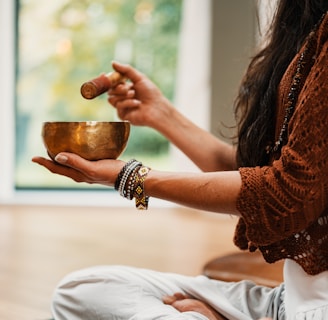How to Meditate: A Comprehensive Guide for Beginners and Beyond
How to Meditate: A Comprehensive Guide for Beginners and Beyond. Discover the ultimate guide to meditation that goes beyond the basics. Learn how scents, sounds, and advanced techniques enhances your practice. Uncover actionable steps, scientific insights, plus tips to start meditating effectively today. Find inner peace, while transforming your life with this comprehensive guide.
HEALTH AND WELLNESS
Vidcliq.com
1/24/20253 min read


How to Meditate: A Comprehensive Guide for Beginners and Beyond
Meditation is a powerful practice that brings calm, focus, and balance to your daily life. While many top articles on meditation provide basic techniques, this guide dives deeper, exploring aspects often overlooked. In addition to basic techniques, we'll cover the role of scents, sounds, and fresh perspectives on meditation practices. Let’s explore everything you need to know about meditation, including actionable steps and unique insights to enrich your practice.
What is Meditation?
Meditation is the practice of focusing your mind to achieve mental clarity, emotional calmness, as well as self-awareness. It has roots in various cultures and spiritual practices. Meditation is also embraced as a secular method for stress reduction and self-improvement.
Sources:
Learn more about meditation: Mayo Clinic.
Discover the history of meditation: Headspace.
Why Should You Meditate?
Meditation offers numerous benefits; reduced stress, improved concentration and better emotional health. It even provides physical benefits like lower blood pressure. What many don’t mention is the cognitive boost meditation provides by rewiring your brain to respond less reactively to stress and stimuli.
Sources:
Meditation and mental health: Healthline.
Physical health benefits of meditation: Very-well Mind.
Steps to Start Meditation
1. Create a Tranquil Environment
Find a quiet and comfortable space to meditate. Scents, such as lavender or sandalwood, can stimulate the brain’s relaxation centers. This enhances your meditation experience. Diffusers, scented candles, or essential oils are great tools for this purpose.
Sources:
Scents and brain connection: National Library of Medicine.
2. Use Sound to Enhance Focus
Incorporate soothing sounds like binaural beats such as, Tibetan singing bowls, or instrumental music. Studies show that certain frequencies, like 432 Hz, promote tranquility and focus.
Sources:
The effect of sound on meditation: Scientific American.
3. Practice Deep Breathing
Begin with deep breathing exercises. The 4-7-8 method, where you inhale for 4 seconds, hold for 7, and exhale for 8, is particularly effective for relaxation.
Sources:
Deep breathing benefits: Cleveland Clinic.
4. Experiment with Techniques
Try different styles of meditation, including mindfulness, guided, or mantra meditation. Each style offers unique benefits. Experiment to see what works best for you.
Sources:
Types of meditation: Mindworks.
Beyond Basics: Advanced Tips for Meditation
1. Incorporate Movement
Yoga, tai chi, or walking meditations can help those who find sitting still to be challenging.
2. Set an Intention
Start your session by focusing on a word or goal, like “peace” or “clarity.” This'll help anchor your thoughts.
3. Explore Guided Meditation Apps
Apps like Insight Timer, Calm, or Headspace provide guided meditations for all skill levels.
Sources:
Best meditation apps: TechRadar.
New Perspectives: The Role of Scents and Sounds in Meditation
While traditional meditation focuses on posture and breathing, incorporating scents and sounds can significantly elevate your practice. Lavender reduces anxiety. Citrus scents boost energy. Vanilla promotes happiness. Similarly, meditative music or natural sounds can guide your focus, deepening your relaxation.
Sources:
Aromatherapy in meditation: NIH.
The science behind meditation sounds: Psychology Today.
Common Misconceptions About Meditation
You Must Clear Your Mind: The goal is not to eliminate thoughts, but to observe them without attachment.
Meditation is Religious: While it has spiritual roots, it can be entirely secular.
You Need Hours to Meditate: Even 5-10 minutes daily can make a difference.
Sources:
Debunking meditation myths: BetterHelp.
Final Thoughts
Meditation is a journey of self-discovery. aThis is where you find your inner peace. By experimenting with scents, sounds, and different techniques, you can find a practice that resonates with you. Start small, but be consistent, and enjoy the transformation that meditation brings.
For more tips on living a balanced life, check out our related post: How to Create a Budget.
Sources for this article:
Meditation isn’t just about calming the mind, it’s about enhancing your life. Dive in, experimenting, finding your path to serenity today!
Boost
Enhance your visibility with optimized blog posts.
Engage
Rank
vidcliqsupport
© 2024. All rights reserved.